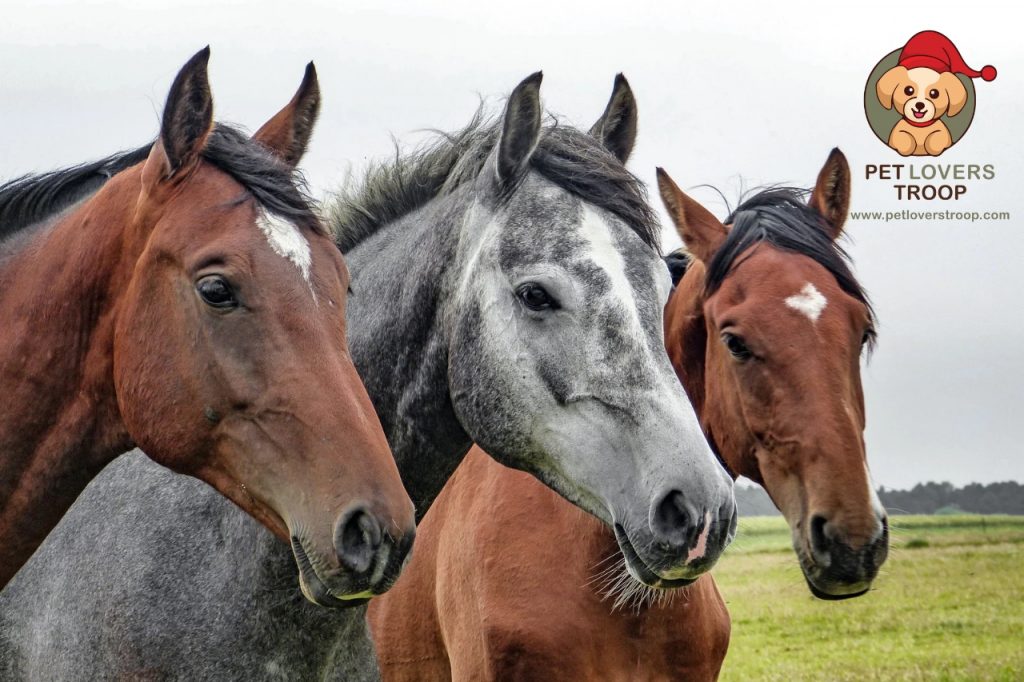Being a horse keeper, you should take care of his everyday needs, like shelter, feed, environment, and hygiene. As we know, horses are popular for their strong build and adorable behaviour, but they can catch a horrible disease called equine infectious anemia if you don’t take basic precautions. The equine infectious anemia in horses is not likely to allow them to live their normal, happy, and active life.

What do you know about Equine Infectious Anemia in Horses?
Equine infectious anemia is a nontransmissible disease caused by lentivirus, a similar virus to the Human immunodeficiency Virus (HIV). The EIA is restricted to equids ( a small family that includes horses, wild assess, and zebras).
Read more: The Secret Benefits of Cat Grass: Why Your Feline Friend Craves It – June 2025
Equine infectious anemia in horses is also known as horse malaria or swamp fever. If any equine gets infected by this virus, it will become a carrier throughout its life. Sometimes this disease becomes life-threatening, and the last option that would be left is humane euthanasia.
The virus of this worldwide deadly disease is present in the victim’s white blood cells and serum plasma, and as the horse gets exposed to stress, the virus multiplies more rapidly.
Check out: Decoding Cat Tail Signs: What Your Feline Friend’s Tail Is Telling You – January 2025
How do Horses get an Infection?
As equine viral disease is noncommunicable, it does not spread through contact, but it can spread through blood. If any of the other horses have Equine infectious anemia, then it can be transmitted through biting flies, recycled needles or syringes on different horses, and insufficient hygienic maintenance.
The contaminated needle or syringe can spread EIA. Improper sterilization and using dirty tools play a vital role in transmitting the virus among horses. Blood transfusion with infected blood can cause EIA.
Most of the time, equine infectious anemia in horses is asymptomatic and does not show any signs, which is why every horse owner needs to check or test their horses religiously. The spread of EIA in horses is commonly due to the bloodsucking insects and flies, or the other usual way of transmission is uterine infection of the fetus.
Know more about: Equine infectious anemia (EIA)
Horses that are less than 12 months old and have tested positive are more likely to receive it from their maternal side, while those that are above 12 months old and found positive afterwards are known as virus carriers.
This progressive disorder keeps deteriorating the horse’s health day by day and eventually leads to death. An EIA-positive mare can easily transfer the virus to her foal in utero or through milk, and even during delivery of the foal.
Possible Clinical EIA Symptoms in Horses
If the horse gets an infection, then the primary sign or indicator any of the horses shows is muscle fragility, as this virus is immunodeficient means it directly suppresses the immune system of the victim. Now the horses are more prone to catching any infection.
Learn more about: Fleas and Ticks in Pets: How to Prevent and Treat Infestations – June 2025
The EIA symptoms in horses included
- Fever
- Loss of appetite
- Generalized weakness
- Diarrhea
- Breathing problems, which led to decreased stamina.
If your horse gets sick more often, you should get a Coggins test done as soon as possible. The other symptoms are depression, muscle wasting, and weight loss. The blood test of a virus-carrying horse shows a low platelet count termed as thrombocytopenia, which is why the infected horse can develop multiple hemorrhages and become anemic.
Check out: Traveling with Pets: How to Make Trips Safe and Stress-Free – March 2025
The early signs that appear in any EIA-positive horse are recurrent fever, malaise, and swollen legs. In the chronic cases, the victim has episodic attacks of an acute form of disease, which causes their health to decline. More frequent urination makes the horse more fragile, and it may progress to jaundice, a yellowish discoloration that starts to appear medically is termed as icterus. The abortion in pregnant mares is mostly seen in EIA.

How can Equine Infectious Anemia be Diagnosed?
To recognize whether your horse is infected or healthy, it needs to undergo the coggins test. The important marker for this disorder is the Coggins test for horses, which is conducted immunologically with AGID (agar gel immunodiffusion). The positive test shows antibodies of equine infectious anemia in serum blood that have the capability to destroy red blood cells, and it can be done after 2 to 3 weeks of exposure.
Another test we use to check the presence of equine infectious anemia in horses is ELISA (enzyme-linked immunosorbent assay), which has less sensitivity and validity than AGID. We get quicker results from the ELISA than AGID, but the results of AGID are more accurate and reliable. In some cases, the veterinarian has to confirm or recheck the results of ELISA with AGID.
Check out: How to Introduce a New Pet to Your Home: A Guide to Introducing a New Pet – March 2025
Over 600,000 to 900,000 horses are tested annually, and around 0.3% to 0.5% are diagnosed with equine infectious anemia. Don’t forget to report positive cases to the Canadian Food Inspection Agency and public health authorities.
What are the Possible Treatments for Equine Infectious Anemia in Horses?
Honestly speaking, there is no cure or vaccine for equine infectious anemia, but we can take some precautionary measures to ensure a better quality of life for the victims of equine infectious anemia. The infected horses should be quarantined for their whole life, and make sure that the others remain safe. Do take care of his regular healthy feed and keep him stress-free for their betterment.
Check out: A Beginner’s Guide to Raising Ducks as Pets: Everything You Need to Know – December 2024
To make the sick horse’s life healthier, you should look after his nutritional needs and hydration so that your poor, ill friend feels loved and alive.
Preventive Measures for Equine Infectious Anemia
If you are interested in buying a pet horse, then first you should get the coggins test done and bring it to your home. The annual check-up of your pet horse is as important as their daily feed. Monitor all the signs and symptoms your horse shows. Maintaining quality hygiene plays a crucial role in preventing EIA in horses. Regular veterinarian checkups are a must for every pet keeper.
Unfortunately, if the horse’s Coggins test is positive, then you should not panic.
- The first thing you have to do is isolate him and keep a distance of at least 200 yards away from other horses.
- Assure that the exposed victims feed separately and keep them clean, using insect repellent, especially during the biting flies ‘ breeding season (May to September), which makes the less possible for flies to be around them.
- The Coggins certification of all horses is required and must be documented if you are keeping a horse.
Check out: Bird Nutrition Basics: What to Feed your Pet Bird for a Balanced Diet
Biosecurity is the best source of preventing EIA in horses that ensures the other horses are secure and disease-free. Isolating your diseased horse and not breeding them causes fewer cases of equine infectious anemia.
Conclusion
Equine viral disease is a lethal and painful disease for horses, so to keep your strongest pet safe, you have to follow above mentioned preventive measures. As the treatment for equine infectious anemia is impossible, like AIDS in humans, as this disease carries the same family of viruses. There is no evidence or study of transmitting this dangerous disorder to humans.

FAQ‘s
1- How can I protect my horse from equine infectious anemia at home?
Firstly, don’t panic, your pet depends on you, so keep yourself together and practice healthy cleaning habits, keep your horse insect-free, choose a trusted and qualified veterinarian who is reliable, and use sterilized equipment.
2- Can a pregnant mare transmit equine infectious anemia virus to their unborn foal?
Of course, an equine infectious anemia-positive mare can naturally pass this virus to their unborn foal; that’s the reason an infected mare should get an abortion done.
3- Is it important to euthanize an equine infectious anemia-infected horse?
A permanent isolation of an infected horse can be difficult for the keeper and painful for the horse. That’s the reason humane euthanize is suggested to horse owners to keep other horses healthy and safe.
4- Is it important to get a Coggins test certificate?
Yes, it is very important to complete the Coggins test certification as soon as possible so you can easily attend EIA negative events.
